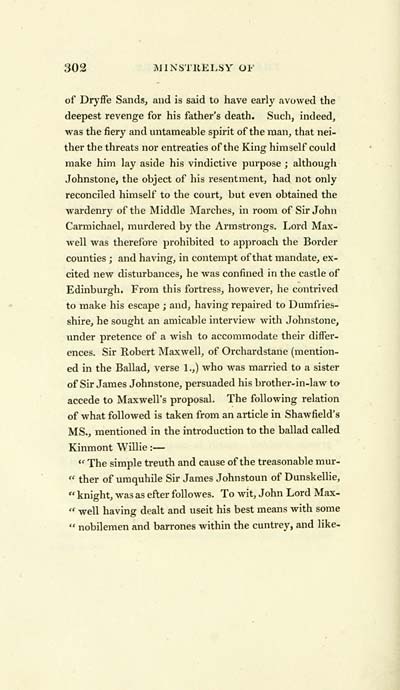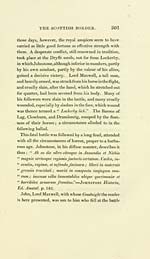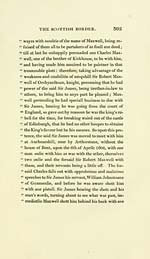Download files
Complete book:
Individual page:
Thumbnail gallery: Grid view | List view

302 MlNSTllELSY OF
of Dryffe Sands, and is said to have early avowed the
deepest revenge for his father's death. Such, indeed,
was the fiery and untameable spirit of the man, that nei-
ther the threats nor entreaties of the King himself could
make him lay aside his vindictive purpose ; although
Johnstone, the object of his resentment, had not only
reconciled himself to the court, but even obtained the
wardenry of the Middle Marches, in room of Sir John
Carmichael, murdered by the Armstrongs. Lord Max-
well was therefore prohibited to approach the Border
counties ; and having, in contempt of that mandate, ex-
cited new disturbances, he was confined in the castle of
Edinburgh. From this fortress, however, he contrived
to make his escape ; and, having repaired to Dumfries-
shire, he sought an amicable interview with Johnstone,
under pretence of a wish to accommodate their differ-
ences. Sir Robert Maxwell, of Orchardstane (mention-
ed in the Ballad, verse 1.,) who was married to a sister
of Sir James Johnstone, persuaded his brother-in-law to
accede to Maxwell's proposal. The following relation
of what followed is taken from an article in Shawfield's
MS., mentioned in the introduction to the ballad called
Kinmont Willie : —
"^ The simple treuth and cause of the treasonable mur-
" ther of uraquhile Sir James Johnstoun of Dunskellie,
" knight, was as efter foUowes. To wit, John Lord Max-
" well having dealt and useit his best means with some
" nobilemen and barrones within the cuntrey, and like-
of Dryffe Sands, and is said to have early avowed the
deepest revenge for his father's death. Such, indeed,
was the fiery and untameable spirit of the man, that nei-
ther the threats nor entreaties of the King himself could
make him lay aside his vindictive purpose ; although
Johnstone, the object of his resentment, had not only
reconciled himself to the court, but even obtained the
wardenry of the Middle Marches, in room of Sir John
Carmichael, murdered by the Armstrongs. Lord Max-
well was therefore prohibited to approach the Border
counties ; and having, in contempt of that mandate, ex-
cited new disturbances, he was confined in the castle of
Edinburgh. From this fortress, however, he contrived
to make his escape ; and, having repaired to Dumfries-
shire, he sought an amicable interview with Johnstone,
under pretence of a wish to accommodate their differ-
ences. Sir Robert Maxwell, of Orchardstane (mention-
ed in the Ballad, verse 1.,) who was married to a sister
of Sir James Johnstone, persuaded his brother-in-law to
accede to Maxwell's proposal. The following relation
of what followed is taken from an article in Shawfield's
MS., mentioned in the introduction to the ballad called
Kinmont Willie : —
"^ The simple treuth and cause of the treasonable mur-
" ther of uraquhile Sir James Johnstoun of Dunskellie,
" knight, was as efter foUowes. To wit, John Lord Max-
" well having dealt and useit his best means with some
" nobilemen and barrones within the cuntrey, and like-
Set display mode to: Large image | Transcription
Images and transcriptions on this page, including medium image downloads, may be used under the Creative Commons Attribution 4.0 International Licence unless otherwise stated. ![]()
| Early Gaelic Book Collections > J. F. Campbell Collection > Minstrelsy of the Scottish border > Volume 1 > (504) |
|---|
| Permanent URL | https://digital.nls.uk/80614374 |
|---|
| Description | Vol. I . |
|---|---|
| Shelfmark | Cam.2.d.17 |
| Additional NLS resources: | |
| Attribution and copyright: |
|
| Description | Volumes from a collection of 610 books rich in Highland folklore, Ossianic literature and other Celtic subjects. Many of the books annotated by John Francis Campbell of Islay, who assembled the collection. |
|---|
| Description | Selected items from five 'Special and Named Printed Collections'. Includes books in Gaelic and other Celtic languages, works about the Gaels, their languages, literature, culture and history. |
|---|

